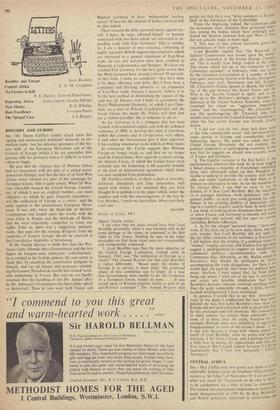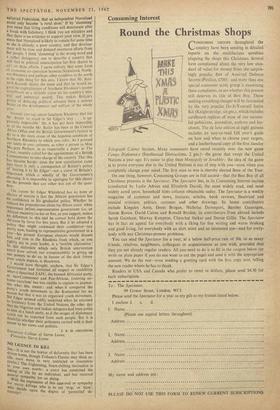CENTRAL AFRICA
SIR,—May I,differ with two points you made in Your admirable leading article on Southern Africa ('Alter' natives to Sir Edgar') of November 9? I am not sore what you mean by 'Nyasaland on its own is likelY, to be condemned. for a time at least, to slumming. oe The remark has unfortunate undertones of statements made disingenuously in 1959 by Sir Roy Welen‘LY and British politicians interested in maintaining 11/ enforced Federation, that an independent Nyasaland could only become 'a rural slum.' If by 'slumming' You mean that living conditions will deteriorate after a break with Salisbury, 1 think you are mistaken and that there is no evidence to support your view.. If you mean that Nyasaland is likely to remain for some time as she is already, a poor country, and that develop- ment will be slow and demand enormous efforts from her people, I think 'slumming' is the wrong word and a rather derogatory one to describe a country that Will find in political emancipation her first chance to cal' on these efforts. I agree entirely that some form 01 economic co-operation between Nyasaland, North- ern Rhodesia and perhaps other countries to the north is the right thing for this area. I know that Mr. Ken- neth Kaunda thinks the same and that he would re- gard the capitalisation of Northern Rhodesia's poorer neighbours as `a suitable claim on his country's min- eral and industrial wealth. This makes Britain's Policy of delaying political advance there a serious brake on the development and welfare of the whole area ,,,,Second, you say about Southern Rhodesia that for Mr Butler 'to stand in Sir Edgar's way . . is ap- parently impossible.' Sir, it has not been impossible in all the months Mr. Butler has been at the Central Africa Office and the British Government's failure to do so is the main cause of the hopeless condition of Southern Rhodesia to which you refer. As I pointed out lately in your columns, as sober a person as Miss MagerY Perham, in as respectable a paper as The recently called for the appointment of a British Commissioner to take charge of the country. That this has become harder since the new constitution came into force is only a consequence of Britain's policy of `leaving it to Sir Edgar'—not a cause of Britain's impotence which is wholly of the Government's choosing. It is impossible to apologise for this choice on the grounds that any other was out of the ques- tion The reason Sir Edgar Whitehead has no hone or Chance of success is that the African population has no confidence in his gradualist policy. Whether he reduces his preposterous claim for fifteen years' white supremacy before representative government (i.e. an African majority) to ten or five, as you suggest, makes no difference to this and he cannot hold down the Africans by force for five years. But if he adopted a Policy that might command their confidence—say parity now, leading to representative government in a present European electors would disown him and vote in the Rhodesia front which, as you rightly say in your leader, is a 'terrible alternative.' In this stalemate which only British intervention could have solved, our irresponsibility in giving up Our Powers to do so, in favour of the dark future Your article depicts, is disastrous. I would have thought, anyhow, that Sir Edgar's Government had forfeited all respect or credibility when it described ZAPU, the banned Africanist party, 'neo-Communist and Pan-African, fostering ex- treme racialism' but was unable to explain to journal- ists what this meant: and when it compared the Party's youth movement to the Komsomol for no reason but that it was an organised youth movement. soEdgar seemed oddly surprised when he returned
Salisbury from the United Nations the other day
Iaat Nigerian and Indian delegates had been polite him at a lunch party, as if the usages of diplomacy could not be expected from such people. But it is doubtful ful whether their politeness carried with it their assent to his views and policies.
If nivel- M. CREIGHTON If nivel- Any College of Sierra Leone,
Freetown, Sierra Leone











































































 Previous page
Previous page